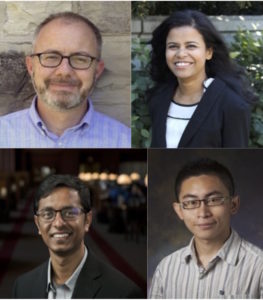
Left to Right (top), Mark Embree, Tanushree Mitra; (bottom) Srijan Sengupta, Jia-Bin Huang
The Discovery Analytics Center welcomes four new faculty this fall who will help lead Virginia Tech’s big data research and education efforts on campus.
“Data analytics is inherently interdisciplinary and our new faculty bring expertise that will bolster our strengths in matrix computations, statistical methodology for network data, computer vision, and information credibility as we strive to find data solutions to modern problems,” said Naren Ramakrishnan, the Thomas L. Phillips Professor of Engineering in the Department of Computer Science and director of the Discovery Analytics Center.
The center has become a well-recognized force among the analytics community within the commonwealth and beyond and fosters multi-stakeholder collaborations with fellow universities, leading industry affiliates, government agencies, and nonprofit organizations. Officially housed within the Computer Science Department, faculty and graduate students represent computer science, statistics, electrical and computer engineering, and math.
The four new faculty are: Mark Embree, professor of mathematics and associate director of the Virginia Tech Smart Infrastructure Laboratory; Jia-Bin Huang, assistant professor of electrical and computer engineering; Tanushree (Tanu) Mitra, assistant professor of computer science; and Srijan Sengupta, assistant professor of statistics.
A Virginia Tech alumnus, Mark Embree received a bachelor’s degree in computer science and mathematics in 1996. He earned a doctor of philosophy degree in numerical analysis from Oxford University, where he was a Rhodes Scholar, and taught at Rice University from 2001 to 2013. In 2014, he returned to Virginia Tech in Blacksburg to lead the Computational Modeling and Data Analytics program in the College of Science Academy of Integrated Science.
Embree’s research interests include numerical analysis, especially matrix computations; data analytics for smart buildings; dynamics and perturbation theory for non-self-adjoint operators; and spectral theory for Schrödinger operators.
He has authored numerous papers and technical reports and is coauthor of “Spectra and Pseudospectra: The Behavior of Nonnormal Matrices and Operators,” published by Princeton University Press.
Jia-Bin Huang, joined Virginia Tech in 2016. He earned a bachelor’s degree in electronics engineering from National Chiao-Tung University in Taiwan and a Ph.D. in electrical and computer engineering at the University of Illinois at Urbana-Champaign.
In 2014, Huang received the best paper award at the Association for Computing Machinery Symposium on Eye Tracking Research and Applications. In 2012, he received the best student paper award at the International Association for Pattern Recognition conference for his work on computational modeling of visual saliency.
His research interests include computer vision; computer graphics; and machine learning with a focus on visual analysis and synthesis with physically grounded constraints.
Tanushree (Tanu) Mitra joined Virginia Tech after earning a Ph.D. in computer science from the Georgia Institute of Technology in August 2017, where the GVU Center named her a Foley Scholar, the highest award for student excellence in research contributions to computing.
She was an IBM Ph.D. Fellowship Recipient in 2016 and selected to attend the Consortium for the Science of Socio-Technical Systems, a National Science Foundation-funded workshop for promising junior investigators.
Mitra earned a master’s degree in computer science from Texas A&M University and a bachelor’s degree in computer engineering from Sikkim Manipal Institute of Technology in India. Her internships included IBM Research and Microsoft Research.
Mitra’s research combines computational techniques and social science principles to study complex social processes underlying human behavior in large-scale online social systems. Specific topics of focus include social computing; computational social science; social media content analysis; data mining; credibility perceptions; misinformation and deception; online communities; and quantitative and qualitative data analysis.
Srijan Sengupta joined Virginia Tech in 2016 as assistant professor of statistics after earning a Ph.D. in statistics from the University of Illinois at Urbana-Champaign. For his dissertation, “Statistical analysis of networks with community structure and bootstrap methods for big data,” Sengupta was awarded the university’s Norton Prize for Outstanding Ph.D. Thesis.
Sengupta received both a bachelor’s and master’s degree in statistics, both with first class distinction, from the Indian Statistical Institute.
His research interests are primarily in statistical methodology for network data; bootstrap and related resampling methods; big data; and computational statistics. Sengupta is also interested in statistical applications in wide-ranging problems in science and industry.

